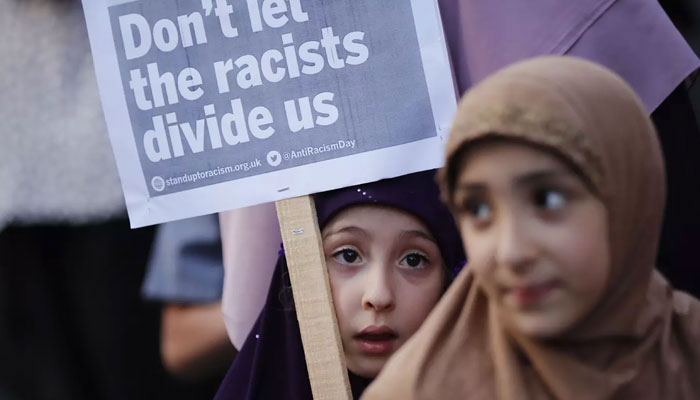Islamophobic tide
They are ‘insiders’ in West, having lived, worked, worshipped and fought for region for decades
Muslims have been living in the cities and towns of western Europe for around a century by now. By all accounts, they are still the most persecuted, discriminated against, stereotyped and profiled group in the region and, arguably, throughout much of the Western world as well. They are by any measure ‘insiders’ in the West, having lived, worked, worshipped and fought for the region for decades. And yet, they are treated like permanent outsiders. Muslims, be they citizens or recent immigrants, have been the favourite target of the far-right in the West while mainstream politicians have institutionalized immigration and internal security policies that systematically and unfairly target Muslims. At least in the UK, this toxicity has now spread beyond the halls of officialdom and the most extreme members of the right wing and seeped into much of the wider population. Evidence of this can be seen in the chaos enveloping the country following the stabbing of three young girls in the town of Southport in northwest England. The far right seized on the attack and spread misinformation about the identity of the alleged perpetrator, falsely claiming that he was an immigrant and/or a Muslim. Not that it would matter even if this was the case, but tarring large groups of different individuals is the calling card of bigots and extremists everywhere.
These claims appear to have been swallowed hook, line and centre by many people, with violent riots breaking out in several towns and leaving a trail of destruction in their wake. Mosques are now being offered extra security, hotels housing asylum seekers are being attacked and several shops and other businesses have been looted throughout the country. The situation has gotten so bad that the UK policing minister was forced to clarify that there will be no need to bring in the army. Many, including the authorities, have labelled the protesters as an isolated band of ‘far-right thugs’ and promised swift action against them. This narrative is arguably missing the true scope of the problem. Given the many thousands taking part in the riots, it is safe to assume that the ‘far-right’ narratives against Muslims have a much wider appeal than was previously thought. This is no longer about a few hundred alienated white men spreading hateful lies on social media. The extremists now have the numbers to cause widespread mayhem in the real world and bring one of the world’s most advance countries in the world to the brink of a national emergency.
This view is backed by the fact that far-right parties made considerable gains in the UK’s recent general elections, with the Nigel Farage-led Reform UK party winning 14.3 per cent of the aggregate votes. This is a historically successful performance for a far-right party in Britain. Outside of the British Isles, the attitude towards Muslims is no less hostile. In Italy a government that is openly hostile to Muslim immigrants and is making it harder for NGOs to rescue migrants stranded at sea has been voted into power. Meanwhile, in the Netherlands anti-Islam populist Geert Wilder’s party became the largest in the Dutch parliament after the November 2023 elections. In fact, rampant Islamophobia was often seen as something that was more of a mainland Europe problem and something that the UK had avoided. This is clearly not the case. The tide of Islamophobia in the West is only growing and appears to have more official and popular support than ever before.
-
 Paul McCartney Talks 'very Emotional' Footage Of Late Wife Linda In New Doc
Paul McCartney Talks 'very Emotional' Footage Of Late Wife Linda In New Doc -
 Princess Beatrice, Princess Eugenie's Response To Andrew's Arrest Revealed
Princess Beatrice, Princess Eugenie's Response To Andrew's Arrest Revealed -
 King Charles And Princess Anne Bestow Honours At Windsor Castle
King Charles And Princess Anne Bestow Honours At Windsor Castle -
 King Charles 'worried' As Buckingham Palace, Royal Family Facing 'biggest Crisis'
King Charles 'worried' As Buckingham Palace, Royal Family Facing 'biggest Crisis' -
 Milo Ventimiglia Recalls First Meeting With Arielle Kebbel On The Sets Of 'Gilmore Girls' Amid New Project
Milo Ventimiglia Recalls First Meeting With Arielle Kebbel On The Sets Of 'Gilmore Girls' Amid New Project -
 Eric Dane Infuriated After ALS Diagnosis As He Feared The Disease Would Take Him Away From His Girls
Eric Dane Infuriated After ALS Diagnosis As He Feared The Disease Would Take Him Away From His Girls -
 It's A Boy! Luke Combs, Wife Nicole Welcome Third Child
It's A Boy! Luke Combs, Wife Nicole Welcome Third Child -
 Leading Astrophysicist Shot Dead At Southern California Home
Leading Astrophysicist Shot Dead At Southern California Home -
 Johnny Depp's Kind Gesture Towards Late 'Grey's Anatomy' Actor Eric Dane Before Death Laid Bare
Johnny Depp's Kind Gesture Towards Late 'Grey's Anatomy' Actor Eric Dane Before Death Laid Bare -
 How Princess Eugenie, Beatrice React To Andrew Arrest?
How Princess Eugenie, Beatrice React To Andrew Arrest? -
 Kylie Jenner 'convinced' Gwyneth Paltrow Is 'crushing' On Timothee Chalamet: 'It's Disrespectful'
Kylie Jenner 'convinced' Gwyneth Paltrow Is 'crushing' On Timothee Chalamet: 'It's Disrespectful' -
 Gemma Chan Reflects On 'difficult Subject Matter' Portrayed In 'Josephine'
Gemma Chan Reflects On 'difficult Subject Matter' Portrayed In 'Josephine' -
 Blood Falls In Antarctica? What Causes The Mysterious Red Waterfall Hidden In Ice
Blood Falls In Antarctica? What Causes The Mysterious Red Waterfall Hidden In Ice -
 AI Power Play: Nvidia Moves To Invest $30 Billion In OpenAI
AI Power Play: Nvidia Moves To Invest $30 Billion In OpenAI -
 Will Savannah Guthrie Ever Return To 'Today' Show? Here's What Insiders Predict
Will Savannah Guthrie Ever Return To 'Today' Show? Here's What Insiders Predict -
 Andrew Mountbatten-Windsor In A Fix Over New Disturbing TMZ Photos
Andrew Mountbatten-Windsor In A Fix Over New Disturbing TMZ Photos




